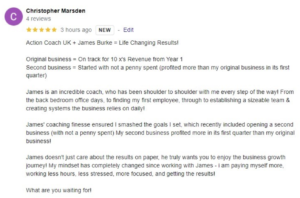The Future of Management: Trends to Watch in the Next Decade
The world of business is evolving, and management practices are evolving fast. The future of management hangs in the balance. And things are changing at a rapid pace.
Those that insist on burying their head in the sand will feel it.
Staff will leave.
They’ll underperform.
Need more hand-holding.
And need more help…
…If you don’t get this right.
As technology advances and consumer behaviour changes, small business owners have to adapt.
But it’s not only the technology, marketing, and sales in your business that needs change.
The management strategies have to innovate as we see a new generation enter the workforce.
And whilst a new generation enters……another generation has started to dominate.
Millennials are becoming the dominant force in the workplace.
So if you want to stay ahead of the competition, you’d better learn to manage in a different way.
But what does the future of management look like for small business owners?
In this article, we’ll explore the changing landscape of management practices.
And explain why it’s crucial for you to stay up-to-date with these changes.
Whether you’re a seasoned business owner or starting out, this article will tell you everything you need to know.
You’ll pick up actionable tips to help you succeed in the ever-changing world of business management.

Embracing Technology In Management
Hold onto your hats because the world of technology is unleashing a whirlwind of change.
And management practices are right in the eye of the storm.
It’s an exciting time to be in business.
We’re going through massive change.
Let’s start with automation, artificial intelligence (AI), and robotics.
They are changing the way we manage people and run our companies.
Gone are the days of mundane manual tasks that used to eat up hours of your precious time.
Thanks to automation, businesses can now automate repetitive processes.
It helps free up valuable resources.
And allows employees to focus on more creative and strategic endeavors.
From automating inventory management to streamlining customer support with chatbots, the possibilities are endless.
It’s like having an army of tireless virtual assistants at your fingertips.
But there’s more.
Artificial intelligence, is making its mark on management practices.
Using AI – The Future Of Management
AI-powered algorithms can analyse massive amounts of data in a fraction of the time it would take a human.
It helps uncover valuable insights.
And spot patterns that were once hidden in the data haystack.
It can forecast market trends…
…and personalise customer experiences.
Without you lifting a finger.
AI is even transforming decision-making processes and driving business growth.
And let’s not forget about the rise of robotics, which is reshaping the way we perform physical tasks.
From automated assembly lines in manufacturing plants, to drones delivering packages…
…robots are increasing human capabilities and improving efficiency across various industries.
They’re not here to replace us.
They’re here to collaborate and take on the tasks that are better suited to their robotic prowess.
But that’s not the end of the story.
Here’s where AI starts to change management.
Now.
And forever.
Data analytics, cloud computing, and remote working tools have already started to transform how we manage.
And they are the tip of the iceberg.
Data analytics allows businesses to extract meaningful insights from vast amounts of information.
So you can start making decisions based on data, rather than emotion.
And that’s great management.
Because numbers don’t lie.
But people do.

Delivery Drones Are Likely To Change An Industry
The Cloud
The cloud has changed the way we manage too. It’s so easy to track the team now. The cloud offers businesses the flexibility to access and store data securely.
And collaborate seamlessly.
Which makes it so much easier to scale their operations.
And with remote collaboration tools becoming more sophisticated, teams can collaborate.
Regardless of their physical location.
Distance is no longer a barrier to productivity and innovation.
But that’s brought about some changes in management.
And if you use it well, you can be a MORE effective manager.
Managers used to rely on their gut.
And often, they could see the team member sitting at their desk and presumed they were working.
Well, data analysis and remote working tools take the presumption out of the equation.
By using the right tools, you’ll know EXACTLY how many minutes your team has been active on their laptops. You’ll know what they’ve done.
And how well they did it.
Results are easy to see when you look at the data.
Which is a MUCH better way to judge someone’s performance.
We’re witnessing a digital revolution that’s changing the way businesses operate.
Embracing these technological advancements isn’t an option.
It’s a necessity to stay competitive in today’s fast-paced world.
So, buckle up. It’s time to embrace the power of automation. Whether it’s AI, robotics, data analysis, the cloud, or remote working tools.
They’re the wind beneath your business’s wings. Propelling you toward a future of efficiency, innovation, and success.
Get ready to ride the wave of this digital transformation.

The Cloud
Employee-Centric Approaches
Alright, let’s shift our focus to something game-changing in the world of management.
Putting the spotlight on our employees.
We are seeing more companies embrace employee-centric approaches.
Looking after the team’s well-being, fostering a culture of trust, transparency, and empowerment.
It’s becoming clear that happy and engaged employees are the secret sauce to success.
Creating an environment where trust and transparency reign supreme can make a big difference.
Businesses can cultivate a sense of belonging and collaboration among their teams.
When employees feel valued and heard, they become more motivated.
They also become more innovative and committed to achieving the company’s goals.

Flexible Working
Flexible work arrangements and remote work are also taking center stage.
They’ll become bigger and bigger in the future of management.
Say goodbye to the rigid 9-to-5 schedule tied to a physical office.
Instead, embrace the freedom and flexibility that come with allowing your team to work when and where they are most productive.
Remote work has become a game-changer.
We are tearing down geographical barriers. And opening up a world of talent and possibilities.
It’s all about finding the right balance between work and personal life. It helps empower employees to thrive in their own unique ways.
But it doesn’t stop there.
The well-being of employees is a crucial factor in the equation.
We’ll see more companies promoting self-care.
The big companies are already doing this.
Google offers it’s employees 24/7 therapy, for free.
And when the big companies start doing something, the smaller companies start to pick it up.
Sometimes it takes a year or two, whilst others it can take decades.
But sooner or later, the change filters through.
We’ll also see more companies promoting work-life integration.
And providing wellness initiatives is no longer an optional perk.
Those things are becoming the norm.
After all, a happy and healthy workforce leads to better results.
The results come from higher productivity, reduced staff turnover, and positive company culture.

Work From Home – The Future Of Management
Continuous Learning and Skill Development
To thrive in this dynamic environment, business owners have to embrace a culture of lifelong learning.
It’s time to bid farewell to the traditional mindset of “learn it once, and you’re set for life.”
In the future of management, staying ahead of the curve means learning. Picking up new skills and knowledge.
Upskilling and reskilling employees has become paramount.
As new technologies emerge and business demands shift, it’s important to equip your team with the skills they need to adapt and thrive.
Whether it’s through workshops, online courses, or mentorship programs.
Investing in employee development ensures that your team remains competitive.
If your team doesn’t improve, how can you grow?
And as we move into an age where personal development becomes mainstream, personal growth is vital.
The Role of Coaching and Mentorship
When it comes to developing effective managers and leaders, coaching and mentorship take center stage.
These invaluable practices provide guidance, support, and continuous feedback that nurture professional growth.
Coaching helps managers enhance their leadership skills. It also helps them navigate challenges, and unlock their full potential.
With coaching, managers will gain insights they’ve never had before. They’ll identify areas for improvement, and develop strategies to grow.
It’s like having a personal cheerleader and mentor by their side.
A coach will encourage them to step up their game and reach new heights.
Mentorship programmes, can be a little different. They often pass on knowledge in a less formal way. Experienced professionals often serve as mentors.
It’s a more casual approach. But a mentor will share their wisdom, experiences, and insights.
By integrating coaching and mentorship into management practices, businesses can explode. Their teams start to perform. And it can create a supportive and empowering environment that nurtures talent.
So, let’s embrace employee-centric approaches.
That’s what the future of management looks like.
And some of the big guys are already starting to get it.
For you, it’s time to prioritise well-being and promote continuous learning.
You’ll also need to harness the power of coaching and mentorship.
And by doing all that you can create a workplace that not only thrives in the present but also paves the way for an incredible future.
Let’s invest in our people, watch them grow, and witness the amazing results that await us.

Summary
Alright, folks, it’s time to wrap things up and bring it all together.
We’ve taken a wild ride exploring the future of management, and boy, what a journey it’s been!
Let’s recap the key points we’ve covered and leave you with some parting thoughts.
In a nutshell, the future of management is all about embracing change and staying ahead of the game.
We’ve seen how technological advancements are reshaping the way businesses operate.
Automation, artificial intelligence, and robotics are causing some serious changes. They are streamlining operations.
And paving the way for a more efficient and productive future.
Data analytics, cloud computing, and remote working tools are also breaking down barriers.
They are enabling teams to work together, regardless of their physical location.
It’s a digital revolution that demands our attention and adaptation.
But it’s about more than technology, it’s also about people.
Employee-centric approaches are taking center stage.
Businesses are starting to realise the importance of fostering a culture of trust.
Flexible work arrangements and remote working are giving employees freedom. With that comes the ability to thrive in their own unique ways.
While well-being initiatives ensure that they feel valued and supported.
Continuous learning and skill development are the name of the game.
Upskilling and reskilling employees has become essential.
It’s all about embracing a culture of lifelong learning and investing in the growth and development of your team.
And let’s not forget the power of coaching and mentorship.
These invaluable practices play a crucial role in developing effective managers and leaders.
By providing guidance, support, and continuous feedback, we can unlock the full potential of our teams. Then create a supportive and empowering environment.
So, my friends, the future of management is bright and full of possibilities.
But it’s up to us to seize the opportunities that come our way.
Embrace change.
Be open to innovative approaches.
And stay informed about the latest trends and advancements in your industry.
Adaptation is the name of the game in this evolving business world.
Remember, you’re not alone in this journey.
Together, we can navigate the twists and turns that lie ahead and create a future where businesses thrive and succeed.
So go out there, embrace the future of management, and make your mark on the world. It’s your time to shine.





